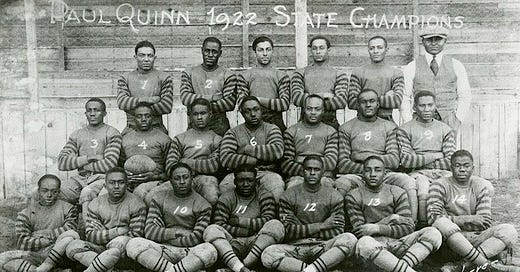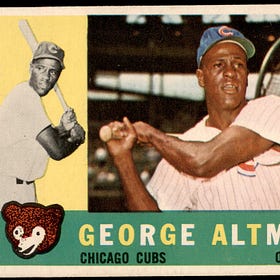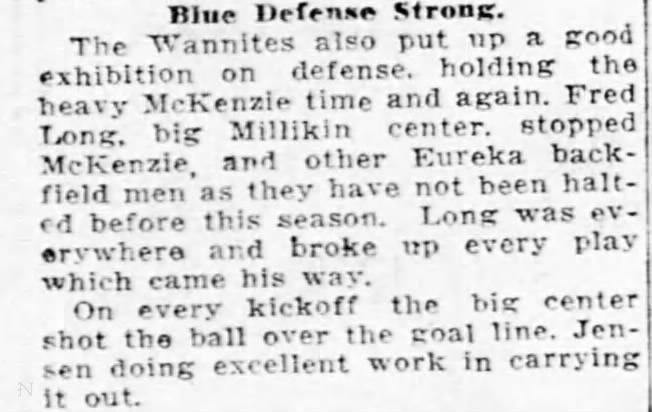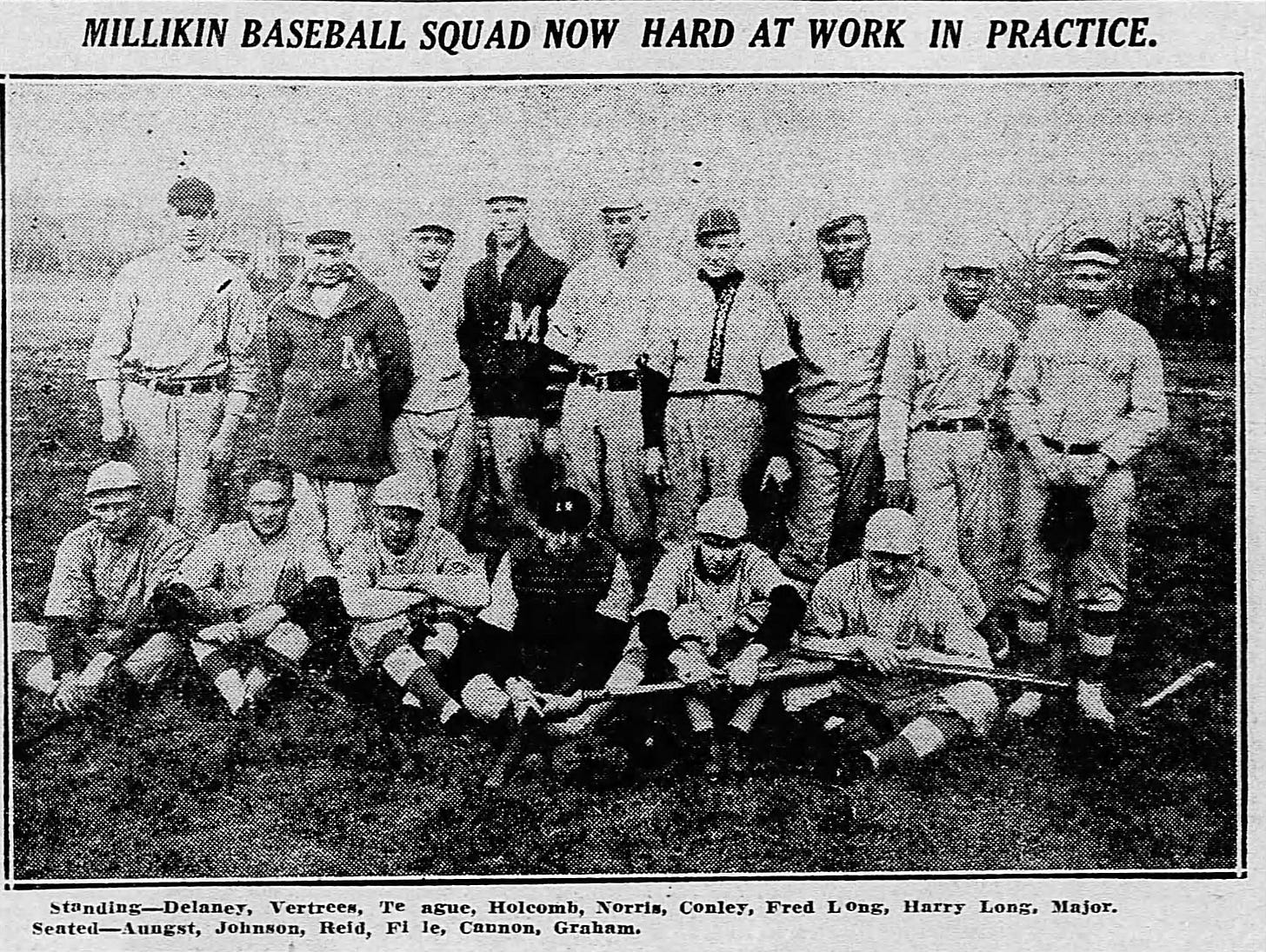A Championship College Football Coach Who Doubled as a Pro Baseball Player
Multiple-time HBCU national championship coach Fred T. Long began his career on the college sidelines while playing baseball in the Negro Leagues.
Researching the college basketball career of former Chicago Cubs All-Star George Altman led me down various paths of discovery about multiple-sport standouts of yesteryear.
March Madness Moments: Chicago Cubs All-Star George Altman & A Groundbreaking Basketball Program
The first installment in The Press Break’s second edition of March Madness Moments actually begins with an August day — and with news from the baseball world.
Among the most fascinating former professional baseball players to have excelled elsewhere in sports is Fred T. Long. Long is one of the top HBCU football coaches of the 20th century’s first half, beginning a career on the sidelines spanning more than 40 years and partially overlapping with a brief stint in pro baseball.
Fred “Pop” Long’s two-sport story begins in Decatur, Illinois, at Millikin University, where he doubled as a star for the school’s football and baseball teams.
“Pop” also joined his brother, Harry, as teammates on the Millikin baseball squad. It wasn’t the only time their college sports careers intersected, either, but more on that in a moment.
In addition to being a two-sport standout, Fred Long’s varsity exploits at Millikin are especially noteworthy given he became the school’s first Black graduate. It also serves to underscore just how insidious professional baseball’s segregation was, with college teams integrated for the 63 years between the end of Moses Fleetwood Walker’s time with the Toledo Blue Stockings of the American Association and Jackie Robinson’s debut with the Brooklyn Dodgers.
Thus, Long embarked on a short pro baseball career in the Negro National League following his graduation from Millikin. He debuted for the Detroit Stars in 1920 and played with the club the next season.
The spotty availability of statistics from the Negro Leagues may obscure Fred Long’s impact in those first two seasons; what’s more, I came across a 1921 newspaper article in my searches that lamented the Detroit Stars in particular keeping inconsistent records, if any at all.
Based on what we have access to today via Seamheads.com, Long played in only 16 games over the 1920 and 1921 campaigns. In the latter season, however, he batted a recorded .306 with an OPS+ of 173 and homered three times. His trio of round-trippers over 11 games mirrors the accounts of Long as a dangerous slugger in college.
Just as Pop Long was finding his pop at the plate, another career opportunity opened up: Long became head coach of the Paul Quinn College football team in 1921.
The Dallas- (and originally Waco) based HBCU served as a charter member for the SWAC in 1920. Long accepted his coaching post and headed up the school’s physical education department. Long told the Herald and Review (Decatur, Illinois) he accepted the job to help with “the betterment of his race.”
Thus began a coaching career that spanned the next 43 years with only a one-year layoff in 1955; and thus ended Fred Long’s time in Negro League baseball…briefly.
Long spent the 1921 and 1922 football seasons coaching Paul Quinn from a 1-2 finish his debut year to the coach’s first of six career undefeated campaigns in ‘22.
PQC went 7-0-1 in that 1922 season, including 4-0-1 in the SWAC. The Tigers surrendered 13 points all season en route to the SWAC championship.
Long moved onto Wiley College for the 1923 season, which is where he cemented his name among the most successful HBCU coaches of all-time. Long helmed the Wiley Wildcats in two different stints from 1923 through 1947, and again from 1956-1965.
It was in Long’s first tour at Wiley that he won three Black National Championships: 1928, 1932 and 1945. He wasn’t the first Long to win the HBCU title, which is still awarded today, however: Brother Harry Long1 coached Paul Quinn to its second SWAC championship in 1924 and the Tigers earned that year’s Black National Championship.
PQC began its undefeated title march with a 7-6 defeat of Pop’s Wiley Wildcats.
Early into the coach’s tenure at Wiley, Long returned to the Negro National League in 1925 for the best season of his pro baseball career. Joining the Indianapolis ABCs as an outfielder, Long hit a recorded .350 in 42 games and 163 at-bats.
In addition to the aforementioned George Altman newsletter sending me down a research rabbit hole on former Negro Leaguers who shined in other sports while in college, Negro League baseball in Indianapolis is another topic that led me to some details on Fred Long’s career.
Indianapolis was long the home to perhaps the most famous Negro League club of all-time and baseball’s forerunner to today’s Savannah Bananas, the Clowns. Before the Clowns brought a Harlem Globetrotters-style blend of entertainment to the diamond, the ABCs were the original club of legendary Oscar Charleston.
Long missed teaming with Charleston, both in Indianapolis and Detroit; Charleston played for the Stars in 1919, one year before Long’s debut with the Motor City club. The 1976 inductee into the Baseball Hall of Fame Charleston left Indianapolis in 1923 for Harrisburg, two years before Long returned to the diamond as a member of the ABCs.
The ABCs struggled mightily in its final three seasons from 1924 through 1926, going from winning 63 games in 1922 to finishing 17-53 in Long’s lone season with the club. Still, that Long juggled some impressive batting numbers in professional baseball while also heading up Wiley College’s football program is remarkable.
Wiley finished 5-1-1 in the 1925 season, the one tie coming in another landmark moment of Long’s athletic career. The Wildcats faced Langston in the inaugural edition of the State Fair Classic, the annual HBCU showcase held at the Cotton Bowl.
The State Fair Classic turns 100 in the upcoming college football season, with Prairie View A&M appearing almost every year since 1947 — including Long’s lone campaign coaching the Panthers in 1948.
The 2024 edition between PVAMU and Grambling State went to five overtimes.
Long’s time at PVAMU wasn’t unsuccessful; the Panthers finished 6-3-1 in 1948. But it was indicative of the latter portion of his career, during which returns to the previous heights were fleeting.
He went 21-32-6 at Texas College from 1949 through 1954, then spent a year out of coaching. Long returned to Wiley for a final run that included one more undefeated finish — 10-0-1 in 1957 — and eight straight seasons failing to post a record better than .500.
Fred Long died shortly in 1966, shortly after his last campaign on the gridiron with Wiley in 1965. The obituary from the Herald & Review nicely condenses a career in sports with few parallels.
The facet of Long’s last years in coaching that I find most frustrating is that it lowered his career winning percentage to 59.06 — 0.94 percent below the threshold for induction into the College Football Hall of Fame.
From the formation of the State Fair Classic, to his three Black National Championships, and his ability to balance coaching football with playing professional baseball, Fred Long deserves a spot in the Hall.
It doesn’t fit in the main narrative, but should be noted that Harry Long left head coaching to be an assistant alongside his brother. Harry was also head of Wiley College’s Biology Department during his days helping guide the Wildcats football program.
Harry died of a heart attack during the 1945 Orange Blossom Classic, in which a Wiley win over Florida A&M sealed the third and final of Fred’s Black National Championships.








